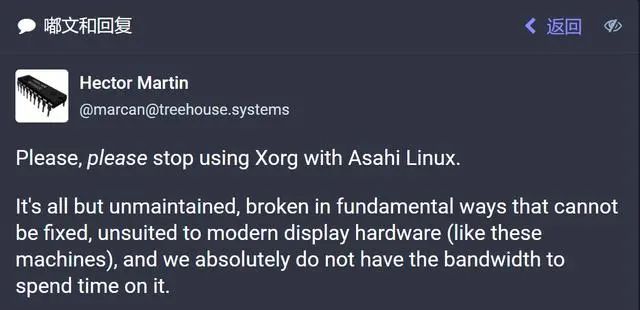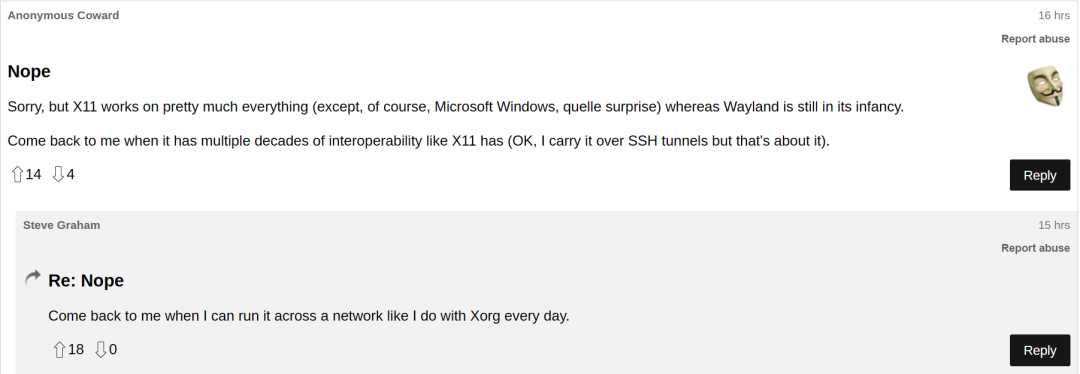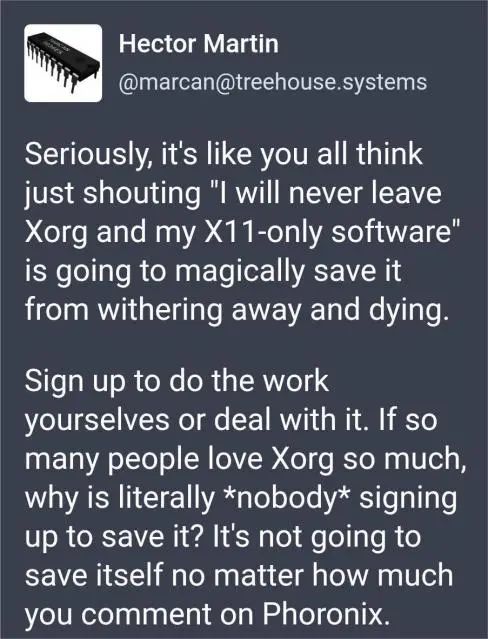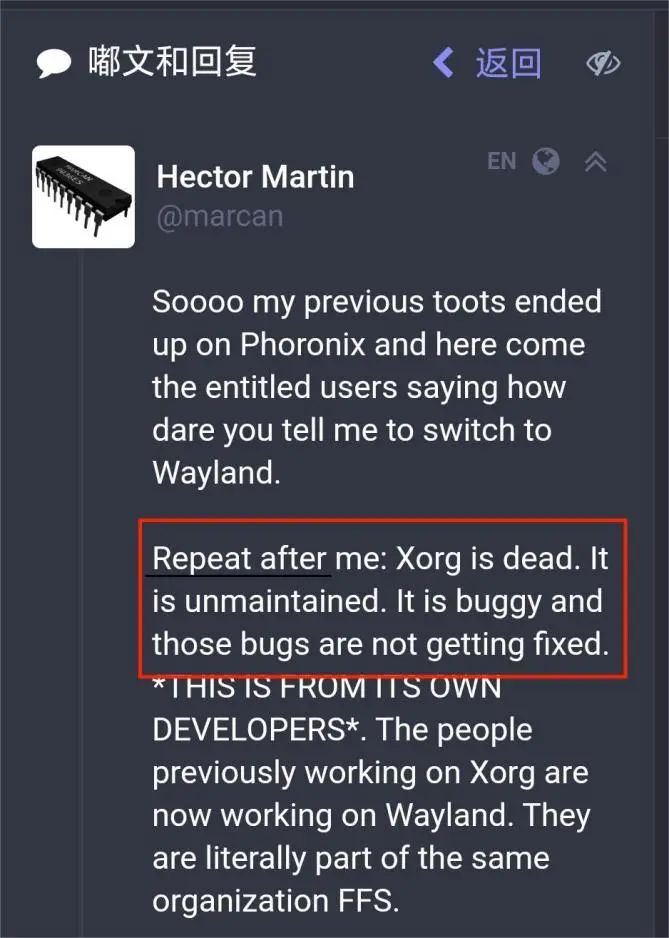 Operation and Maintenance
Operation and Maintenance
 Nginx
Nginx
 Asahi Linux developer warns users: X.Org is dead, Wayland is the future
Asahi Linux developer warns users: X.Org is dead, Wayland is the future
Asahi Linux developer warns users: X.Org is dead, Wayland is the future
Written by Qianshan
A few days ago, Hector Martin, one of the main developers of Asahi Linux, posted a long article on Mastodon, warning Users of the Asahi Linux distribution should stop using X.Org because Wayland is the future.
The original intention of the Asahi Linux project was to port Linux to Mac devices equipped with Apple Silicon chips. Martin said the goal of Asahi Linux is not only to make Linux run on these devices, but also to eventually polish it to the point where it can be used as a daily operating system.
Martin expressed in a new post that he hopes users will cease usage of X.org because "we do not have sufficient resources to dedicate time to it.". Moreover, X.Org is almost unmaintained and is completely unsuitable for modern display hardware. Additionally, many major Linux distributions and desktop environments have stopped supporting Xorg.

Source: Mastodon
He emphasized that Wayland is the future of Apple The only choice for chip graphics desktops. As a compatibility layer between Wayland and X11, Xwayland will continue to support old X.Org applications, so X.org applications will run on Wayland-based desktops, but the developers hope that people will only run on Asahi Linux and related distributions The version uses a Wayland-based environment.
1. X.Org’s Achilles’ Heel
To some extent, switching to Wayland for the nascent Linux on ARM-ISA-based Mac It’s not a shock to the ecosystem. These machines have a single GPU family that is tightly integrated with the main processor, so it doesn't matter which GPU vendor you choose or which driver you run - because you don't have a choice.
Asahi Linux The main reason for using Xorg by default was that the Wayland compositor was slow in terms of software rendering. But now that Asahi Linux has a GPU driver, it will soon switch all default Xorg-KDE users to default Wayland in an update (while also promoting the GPU driver to the default version).
In addition, laptops and Apple's own external screens are called high-density pixel devices, also called "Retina screens" by Apple. This effectively requires the use of fractional scaling - something X.org doesn't quite support. Unlike regular PCs, the Apple chip market is a closed market, with no free choice to mix and match GPUs and displays.
Support for features such as high DPI displays, fractional scaling, and the mixing of heterogeneous monitors with different DPIs are all key weaknesses of Development is minimal and this is unlikely to change.
If you are an avid new user and really enjoy using modern desktop environments like GNOME 40 and KDE Plasma 5, or one of Wayland's few tiled environments, then this might seem like Not a big problem. It may be relatively easy to add support for certain Linux desktops that cannot use the new display server.
For example, Cinnamon is based on GNOME technology - the next version seems to be based on GNOME 43 - although the current version of Cinnamon does not support anything except X.org, as GNOME A fork that should not be that difficult for Cinnamon developers to enable Wayland support.
KDE Plasma already runs great on Wayland, if you need fractional scaling under KDE now it actually runs better on Wayland than on X.org better.
2. Challenges in the popularization of Wayland
However, it is not easy for Wayland to replace Xorg. Most commercially available Linux desktops still do not support Wayland, and some of them may never support it.
Readers who pay more attention may find that the Reg FOSS Desk’s two favorite software are Ubuntu’s Unity environment and Xfce.
Fortunately, Xfce developers are hard at work on their Wayland support - in fact, a recent announcement said that Wayland compositor support has now been merged into the main XFWM4 binary in the file. If all goes well, the next stable version of XFCE may be 4.20 and be able to run natively under Wayland.
However, the chances of this happening with Unity seem very slim. Unity fans will more or less be forced to adopt the new Lomiri environment, but for now it doesn't support the global menu bar, an attractive feature of the Mac-like Unity desktop. Of course, Lomiri still relies on Canonical's Mir display server.
Although some component applications of the MATE desktop environment support the Wayland environment, its current version 1.26.1 still does not support running under Wayland. The latest version of LXQT, 1.30, also has preliminary support for Wayland, but older LXDE environments may never implement Wayland support.
Due to the huge differences in the PC industry, the focus of the low-end market is low prices. Therefore, standard-definition displays are likely to continue to exist for years to come. Therefore, the Apple Silicon Mac line may prove to be a harbinger of future mass extinction events that are heading towards the Linux market. Not only will many older Linux environments never make the transition to the new Wayland world, but since X11 is no longer supported, this new Wayland-only Linux (and possibly FreeBSD) market will suffer from backwards compatibility with older, non-open source UNIX operating systems. It may be significantly reduced.
3. Developers’ debate
About three years ago, someone pointed out that Wayland is the future.
Since then, X.Org has gone more than two years without a major release, and its development activity is at its lowest level in the past decade. In addition, Intel and Red Hat, the companies that mainly maintain X.Org, are no longer willing to invest resources in X.Org servers. It has become an abandoned technology as more and more mainstream distributions have abandoned X.Org Server.
Despite the passage of time, X.Org still has a group of loyal developers, which is based on years of accumulation. The developer's message in the Register forum in the picture is quite representative.
"Sadly, X11 runs on almost every platform (except Microsoft's Windows), and Wayland is still in its infancy. It won't have decades of experience like X11 Don’t talk to me about replacing Wayland again until there’s interoperability.”

Source: Register
Someone soon chimed in: "Come back to me (switching to Wayland) when I can run it on the network like I use Xorg every day."
Martin responded directly to this disapproval: "Seriously, it's like you all think that just shouting 'I will never leave Xorg and my X11 dedicated Software' will magically save it from withering and death. You either do it yourself or deal with it yourself. His soul said to him: "If so many people like Xorg, why doesn't anyone take the initiative to save it?" "

Source: Mastodon
He made no secret of it:" Xorg is dead. It's unmaintained, full of bugs, and the bugs aren't fixed. If you want Xorg to continue running, fix it yourself. Not interested? So does everyone else. Guess what, if no one studies it, it will be forgotten. No one wants to fix it. No amount of wishful thinking can change that. You can keep using it, but unless you register it yourself to maintain it, it will eventually die. ”

Source: Mastodon
Reference link:
https://www.theregister.com/2023/05/17/asahi_linux_wayland_only/?td=rt-3a
https://baijiahao.baidu.com/s?id=1765925358071993657
The above is the detailed content of Asahi Linux developer warns users: X.Org is dead, Wayland is the future. For more information, please follow other related articles on the PHP Chinese website!

Hot AI Tools

Undresser.AI Undress
AI-powered app for creating realistic nude photos

AI Clothes Remover
Online AI tool for removing clothes from photos.

Undress AI Tool
Undress images for free

Clothoff.io
AI clothes remover

AI Hentai Generator
Generate AI Hentai for free.

Hot Article

Hot Tools

Notepad++7.3.1
Easy-to-use and free code editor

SublimeText3 Chinese version
Chinese version, very easy to use

Zend Studio 13.0.1
Powerful PHP integrated development environment

Dreamweaver CS6
Visual web development tools

SublimeText3 Mac version
God-level code editing software (SublimeText3)

Hot Topics
 deepseek web version entrance deepseek official website entrance
Feb 19, 2025 pm 04:54 PM
deepseek web version entrance deepseek official website entrance
Feb 19, 2025 pm 04:54 PM
DeepSeek is a powerful intelligent search and analysis tool that provides two access methods: web version and official website. The web version is convenient and efficient, and can be used without installation; the official website provides comprehensive product information, download resources and support services. Whether individuals or corporate users, they can easily obtain and analyze massive data through DeepSeek to improve work efficiency, assist decision-making and promote innovation.
 How to install deepseek
Feb 19, 2025 pm 05:48 PM
How to install deepseek
Feb 19, 2025 pm 05:48 PM
There are many ways to install DeepSeek, including: compile from source (for experienced developers) using precompiled packages (for Windows users) using Docker containers (for most convenient, no need to worry about compatibility) No matter which method you choose, Please read the official documents carefully and prepare them fully to avoid unnecessary trouble.
 Ouyi okx installation package is directly included
Feb 21, 2025 pm 08:00 PM
Ouyi okx installation package is directly included
Feb 21, 2025 pm 08:00 PM
Ouyi OKX, the world's leading digital asset exchange, has now launched an official installation package to provide a safe and convenient trading experience. The OKX installation package of Ouyi does not need to be accessed through a browser. It can directly install independent applications on the device, creating a stable and efficient trading platform for users. The installation process is simple and easy to understand. Users only need to download the latest version of the installation package and follow the prompts to complete the installation step by step.
 BITGet official website installation (2025 beginner's guide)
Feb 21, 2025 pm 08:42 PM
BITGet official website installation (2025 beginner's guide)
Feb 21, 2025 pm 08:42 PM
BITGet is a cryptocurrency exchange that provides a variety of trading services including spot trading, contract trading and derivatives. Founded in 2018, the exchange is headquartered in Singapore and is committed to providing users with a safe and reliable trading platform. BITGet offers a variety of trading pairs, including BTC/USDT, ETH/USDT and XRP/USDT. Additionally, the exchange has a reputation for security and liquidity and offers a variety of features such as premium order types, leveraged trading and 24/7 customer support.
 Get the gate.io installation package for free
Feb 21, 2025 pm 08:21 PM
Get the gate.io installation package for free
Feb 21, 2025 pm 08:21 PM
Gate.io is a popular cryptocurrency exchange that users can use by downloading its installation package and installing it on their devices. The steps to obtain the installation package are as follows: Visit the official website of Gate.io, click "Download", select the corresponding operating system (Windows, Mac or Linux), and download the installation package to your computer. It is recommended to temporarily disable antivirus software or firewall during installation to ensure smooth installation. After completion, the user needs to create a Gate.io account to start using it.
 Ouyi Exchange Download Official Portal
Feb 21, 2025 pm 07:51 PM
Ouyi Exchange Download Official Portal
Feb 21, 2025 pm 07:51 PM
Ouyi, also known as OKX, is a world-leading cryptocurrency trading platform. The article provides a download portal for Ouyi's official installation package, which facilitates users to install Ouyi client on different devices. This installation package supports Windows, Mac, Android and iOS systems. Users can choose the corresponding version to download according to their device type. After the installation is completed, users can register or log in to the Ouyi account, start trading cryptocurrencies and enjoy other services provided by the platform.
 gate.io official website registration installation package link
Feb 21, 2025 pm 08:15 PM
gate.io official website registration installation package link
Feb 21, 2025 pm 08:15 PM
Gate.io is a highly acclaimed cryptocurrency trading platform known for its extensive token selection, low transaction fees and a user-friendly interface. With its advanced security features and excellent customer service, Gate.io provides traders with a reliable and convenient cryptocurrency trading environment. If you want to join Gate.io, please click the link provided to download the official registration installation package to start your cryptocurrency trading journey.
 How to automatically set permissions of unixsocket after system restart?
Mar 31, 2025 pm 11:54 PM
How to automatically set permissions of unixsocket after system restart?
Mar 31, 2025 pm 11:54 PM
How to automatically set the permissions of unixsocket after the system restarts. Every time the system restarts, we need to execute the following command to modify the permissions of unixsocket: sudo...





